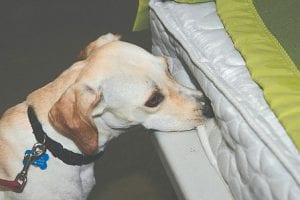This is Macaroni, the bed-bug-sniffing wonder dog. He and his owner, Walter Penny, are in business together in Denver, Colorado but will be coming to Cook County at the end of July. While they are on vacation here, they will be making themselves available to inspect homes, cabins, apartments, condominiums, town homes, and hotels for bed bugs. Walter’s parents are Cook County residents Walter and Anne Penny.

Have you noticed any mysterious red marks on your skin when you wake up in the morning? How about little skin casings or black splotches between your mattresses? Ever wonder how you would know if you had bed bugs? Macaroni could tell you, and he’s coming to town.
Macaroni is a 2 ½-yearold, 34-pound dog who is part beagle, part lab, and maybe part whippet. “That would make him a ‘wabble,’” said his owner and business partner, Walter Penny of Denver, Colorado. Together, the fearsome duo operates Colorado Bed Bug K9, and if there’s a live bed bug in the building, Macaroni can find it.
Penny bought Macaroni from the Florida Canine Academy in Safety Harbor, Florida (in the Tampa/St. Petersburg area), where he was rescued from a shelter, trained, and chosen especially for Penny. TheFlorida Canine Academy trains dogs for sniffing out particular things such as bed bugs, termites, bats, endangered snake species, mold, and even short circuits in underground power cables. Each dog is trained to professionally sniff only one thing. “They interview dogs in shelters,” Penny said. “Theychoose dogs based on certain characteristics rather than breed.”

Above: Macaroni on the job, sniffing for bed bugs. He only alerts to live bed bugs so that his inspections after treatment can accurately determine if the live bugs have been eliminated. Left: Walter Penny, owner of Colorado Bed Bug K9, with his wife Norma. Walter says Norma has been very gracious about him having a business that involves both a dog and bed bugs.
Penny himself received training at the academy when he bought Macaroni. Macaroni had been called “Max” at the academy, but Penny looked at him and said, “You’re Macaroni.” It took Macaroni about 10 minutes to learn his new name.
How did Penny get into this line of work? “I was working for a pest control company and was seeing how bad the problem was first-hand,” he said. Bed bugs were showing up in a lot of apartment buildings and hotels. “I always wanted my own business, and I always wanted my own dog.” He had a good job at the time, but his Colorado Bed Bug K9 business was a perfect way to have both a dog and a business of his own.
Long-nosed dogs with good play and hunt drives are good candidates for sniffing professions. Macaroni only works when Penny directs him to. “He’s like a power tool,” Penny said. “You have to turn him on.” Penny gives several verbal commands and Macaroni goes to work. If he smells live bed bugs, he will sit down. If Penny says, “Show me,” Macaroni will point with his nose.
Macaroni gets rewarded either with kibble and praise, with his “Taste of the Wild” dog food, or with the opportunity to play with his special towel. Penny works with him every single day whether they have a job or not.
“Aside from him being a very good working dog,” Penny said, “he is a fantastic pet. …He loves to play tug of war, and he likes to wrestle.” He runs “like greased lightning,” especially when playing with other dogs. “He’s a really well-behaved, easygoing dog.”
Macaroni’s love of sniffing stays with him all the time. He is constantly sniffing when they go out on walks and enjoys following bunny tracks though the snow.
Macaroni doesn’t bark and howl for no apparent reason like some dogs, Penny said. “I can go days without hearing him bark.” Beagles are notoriously stubborn, he said, but Macaroni isn’t stubborn at all.
Because Penny is called in to inspect premises after treatments to get rid of bed bugs have been done, Macaroni will not alert to dead bed bugs or fecal matter. Penny only wants him to sniff out live ones.
Are you itching yet? Bed bugs are now a worldwide problem, Penny said. “The East Coast is a mess,” he said, not so much because people there travel more but because residences have so many adjacent walls and floors and water and electrical lines that run between apartments, condominiums, and town homes.
Some apartment complexes and hotels bring in canine units regularly to inspect for bed bugs. Penny would like to see a sticker that identifies hotels that have routine professional inspections. It would indicate that the business is at least trying. “It also helps protect them from a liability standpoint as well,” Penny said. “Bed bugs are a huuuuuuge lawsuit thing right now.” New York and New Jersey legislators are working on bed bug legislation and disclosures for selling real estate.
One thing Penny really wants people to know is that having bed bugs has no correlation with cleanliness or social standing. “Anybody can get them,”
he said. “Having bed bugs is not a reflection on the person at all.” His advice is, “Don’t be shy about talking about it. Don’t be embarrassed. It’s nothing to be ashamed of.” Thestigma is making the problem worse. “If everybody was very open about it, it would be easier to deal with it.” People who have identified bed bugs in their homes “would be doing their neighbors a favor by talking about it. Education is power in this case.”
Penny’s wife Norma, who works in software sales, travels a great deal herself, particularly throughout Central and South America. She is working on a master’s degree in global energy management. “She has been a saint,” Penny said. “What other wife would say, ‘You can bring a dog into the house and you can go every day places where there might be bed bugs’?” She might be fairly safe, however, because Penny can say that he has never known a technician who has brought them home. He takes specific measures to keep them from entering the house on either himself or Macaroni.
Penny and Macaroni regularly travel throughout Colorado to find bed bugs. Penny would work anywhere in the world if someone wanted him to. “I would look forward to the adventure. …I love what I do. I’m so happy. I’m such a nerd. …I just love my little dog. I’ll never get rich doing this, but I make an okay living.”
Penny sometimes finds himself at dinner parties. Dinner parties that include very interesting guests. There might be rocket scientists there, literally, but “I’m the guy they want to talk to,” said Penny. “It’s like a bad car wreck. You just can’t look away.”
Penny and Macaroni will be in Cook County visiting Penny’s parents, Walter and Anne Penny, and reuniting with his best friends from high school in Paducah, Kentucky. His friends will be arriving by private jet, but Walter, Jr., and Macaroni will be motoring their way across the country and will be available to work while they are here. For an appointment or more information, go to www. bedbugbeagle.com or call (303)887-3625.
What are bed
bugs?
Bed bugs are wingless insects that feed solely on the blood of warm-blooded animals. Adults are about ¼ inch long and oval in shape. They range in color from almost white to tan, brown, or burnt orange. Shed skins and dark fecal blotches are sometimes found in infested areas.
Bed bugs hide well in cracks and crevices and travel to find food. They prefer humid conditions around 85 degrees but they survive well in colder temperatures where their life cycle is simply longer.
Bed bugs need only one full blood meal to develop to the next stage and can survive for months without food. They often feed on their hosts at night when they are asleep. Bites can cause skin irritation.
Don’t believe everything you hear about bed bugs on the Internet. “You’ll hear a lot of stories that will scare the living daylights out of you,” Penny said. Don’t worry – bed bugs do not spread pathogens or diseases.
Bed bugs became less common at the end of the 20th century but are making a comeback worldwide.
Avoiding, identifying,
and getting rid of bed bugs
Walter Penny, Jr., offers this advice to travelers wishing to avoid bed bugs: Keep luggage as far away from the bed and the floor as possible. Hang up everything you can. Learn to inspect your bed. Penny himself strips the bed and takes the headboard, which is usually hanging by a set of hardware, off the wall so he can see behind it. Bed bugs have even been found in battery compartments of TV remote controls.
Penny’s website includes a slide show that demonstrates how to inspect for bed bugs. Simply having bites on your skin does not prove that the problem is bed bugs. If you have bed bugs in your home or business, talk to a professional about remediation. Penny himself often works with an entomologist at a local university.
If you are staying at a hotel and find bed bugs, Penny advises, go to the front desk and inform the management. Ask to be moved to another room not adjacent to the room with bed bugs or ask them to put you up in another hotel. “They should bend over backwards to accommodate you,”
Penny said. Hotels will eventually face this
problem if they haven’t already.
Penny would recommend to a bed-bugridden client that they call at least three companies to discuss how they would handle the problem. Some use chemicals, but some use heat treatment without any chemicals.
More tips can be found on the Harvard School of Public Health website at www.hsph.harvard.edu/bedbugs/.



Loading Comments